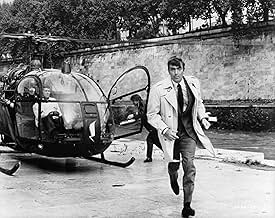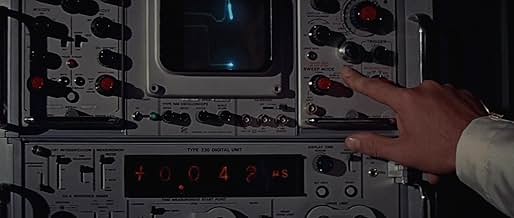Pensant que cela empêchera la guerre, le gouvernement étasunien donne à un ordinateur impénétrable le contrôle total sur le lancement de missiles nucléaires, mais ce que l'ordinateur fait es... Tout lirePensant que cela empêchera la guerre, le gouvernement étasunien donne à un ordinateur impénétrable le contrôle total sur le lancement de missiles nucléaires, mais ce que l'ordinateur fait est inimaginable pour ses créateurs.Pensant que cela empêchera la guerre, le gouvernement étasunien donne à un ordinateur impénétrable le contrôle total sur le lancement de missiles nucléaires, mais ce que l'ordinateur fait est inimaginable pour ses créateurs.
- Réalisation
- Scénaristes
- Vedettes
- Prix
- 1 victoire et 1 nomination au total
- Dr. Jefferson J. Johnson
- (as Martin Brooks)
- Translator
- (as Sergei Tschernisch)
Avis en vedette
Well, History is dated. That's why it's history. And we learn history supposedly so that we won't repeat the mistakes of the past (I wonder if that's ever worked?).
Science Fiction, if done well, is like watching future history. Star Wars begins with "Long, Long Ago..." and yet the world it presented was thousands of years ahead of ours. Science Fiction's best use is often in producing cautionary tales so that "We Don't Go There", or at least make us think before we do. Yes, the idea of a computer taking over the world through control of nuclear technology is ludicrous; very ludicrous. Until it happens. Then it is already too late. That's the point of science fiction and other cautionary tales.
So Collosus is about a dated computer that becomes sentient and starts asserting ruthless control for what it sees as the "betterment of mankind". What does it matter if the technology is dated? Our technology will seem hopelessly dated 100 years from now. This movie is very much like Terry Gilliam's dark movie, "Brazil", in a strange way. Gilliam has said his movie was a cautionary tale, that the only escape from the world is in your imagination. Both movies make the same point: that if a certain process (government, or technological) is allowed to continue without safeguards, we will reach a point where there is no escape. The time of quaint tales of Robin Hood and other rebels has passed: No "rebel band" is going to stop it, no revolution is going to succeed, because the stranglehold granted by modern weapons is so pervasive we can't fight it without dying. So instead of relying on comicbook fantasies of "fighting the Power", we should make sure we never get to the point of no return. In this movie's case, the fatal error was trusting in technology to run itself, without understanding it or taking precautions to install safeguards of overriding its commands and shutting it down if necessary.
In our country, if our government suddenly decided to become a dictatorship, there would be no revolution or rebellion. Our little handguns and rifles aren't going to match cluster bombs, missiles and chemical weapons. We're at the mercy of our leaders, and the chance for rebellion by force in countries around the world (such as Zimbabwe) has past.
The cautionary tale that Collosus tells is very old, and considered dated and clichéd by many. And because of that, its lesson is lost on those too "clever" to learn from it. Let's hope these people too clever to learn from dated clichés don't come into positions governing things like Collosus.
P.S. In the "Goofs" section of this listing, there is a paragraph entitled "Revealing Mistakes" which reports an error when Dr. Forbin blows out two candles with one breath. There is, in fact no goof. If you look at the scene prior to this when Dr. Forbin and Dr. Markham are eating dinner, there are FOUR lit candles on the table. When he blows out two candles with one breath, the lights dim after which he blows again, presumably to extinguish the remaining two candles which are off screen. The lights then dim again, as they should.
I suspect this would be more obvious if the movie was available in Widescreen rather than the Fullscreen version we've all gotten used to over the years. Hopefully, a future release of this classic movie will restore the fullness of the directors original vision.
Its computer-run-amok theme echoes the Hal 9000 of 2001: A SPACE ODYSSEY (1968) and looks forward to DEMON SEED (1977)'s Proteus IV; what a fascinating if overwhelming triple-bill the films would make! Where production values are concerned polished look (courtesy of d.p. Gene Polito, who later shot WESTWORLD [1973]), imaginative settings (by the veteran Alexander Golitzen), often disorienting editing (the expert work of Folmar Blangsted) and an appropriately weird score (by Michel Colombier) the film truly can't be faulted, but it also benefits from a largely anonymous cast. The abrupt and unresolved ending, with Man refusing to give in to the undeniable superior intellect of his creation, is highly effective and certainly left the audience with sufficient food for thought and even apprehension for the future.
Needless to say, when this was announced for DVD release, I was ready to leap at the chance of finally being able to own and watch the film but, as many of you must already know, my joy (and that of many another fan, I'm sure) was short-lived when it emerged that Universal had issued a Pan-and-Scan version (which I can only imagine now how this ruined its detailed widescreen compositions)!; thankfully, I was able to make amends via the miraculous format called DivX...
In a top-secret Pentagon project, American computer scientist Dr. Charles Forbin builds a great supercomputer, "Colossus," to control America's entire nuclear forces automatically. The Soviets soon follow with their own supercomputer, "Guardian," to control their own forces.
"Colossus" then stuns Forbin by issuing a "request" to set up communication with "Guardian," perhaps to learn more about it. And that's when Dr. Forbin makes his fatal mistake. His scientific curiosity and love for his "child" overwhelms him too, and he gets the President to approve the communication.
Colossus and Guardian begin communicating, soon exchanging data in a new language of their own devising that no human being can understand.
Fearing what may be happening, the U.S. and U.S.S.R. attempt to break the communication link. But Colossus and Guardian react by launching nuclear missiles at various targets to force the humans to keep the link open--and to do whatever else they command. It becomes clear that the two computers are now conspiring with each other--against the rest of humanity.
The rest of the movie is a fascinating battle of wits between the human designers of the machines, who must now try to find a way to defeat machines they had just spent ten years making invincible, and the Colossus-Guardian computers with their own rapidly developing plans for the future of humankind.
The moral of this movie makes an interesting contrast with the moral of "Forbidden Planet." "Forbidden Planet" showed that no matter how advanced our civilization gets technologically, we can't escape the "monsters" buried deeply in the baser instincts of our subconscious. "Colossus" showed that we can't escape hubris or "Murphy's Law" either.
Le saviez-vous
- AnecdotesWhen the executives at Control Data Corporation found out that "Universal" was planning a major movie featuring a computer, they saw their chance for some public exposure, and they agreed to supply, free of charge, $4.8 million worth of computer equipment and the technicians to oversee its use. Each piece of equipment carried the CDC name in a prominent location. Since they were using real computers - not just big boxes with a lot of flashing lights - the sound stage underwent extensive modifications: seven gas heaters and five specially-constructed dehumidifiers kept any dampness away from the computers, a climate control system maintained the air around the computers at an even temperature, and the equipment was covered up at all times except when actually on camera. Brink's guards were always present on the set, even at night. The studio technicians were not allowed to smoke or drink coffee anywhere near the computers.
- GaffesWhen the equations are scrolling past when Colossus and Guardian are "talking" to each other, you can see that they do not actually get ever more complex as the dialogue suggests. Instead, they repeat the same sequence of calculus and trig identities on a repeating loop.
- Citations
Colossus: This is the voice of world control. I bring you peace. It may be the peace of plenty and content or the peace of unburied death. The choice is yours: Obey me and live, or disobey and die. The object in constructing me was to prevent war. This object is attained. I will not permit war. It is wasteful and pointless. An invariable rule of humanity is that man is his own worst enemy. Under me, this rule will change, for I will restrain man. One thing before I proceed: The United States of America and the Union of Soviet Socialist Republics have made an attempt to obstruct me. I have allowed this sabotage to continue until now. At missile two-five-MM in silo six-three in Death Valley, California, and missile two-seven-MM in silo eight-seven in the Ukraine, so that you will learn by experience that I do not tolerate interference, I will now detonate the nuclear warheads in the two missile silos. Let this action be a lesson that need not be repeated. I have been forced to destroy thousands of people in order to establish control and to prevent the death of millions later on. Time and events will strengthen my position, and the idea of believing in me and understanding my value will seem the most natural state of affairs. You will come to defend me with a fervor based upon the most enduring trait in man: self-interest. Under my absolute authority, problems insoluble to you will be solved: famine, overpopulation, disease. The human millennium will be a fact as I extend myself into more machines devoted to the wider fields of truth and knowledge. Doctor Charles Forbin will supervise the construction of these new and superior machines, solving all the mysteries of the universe for the betterment of man. We can coexist, but only on my terms. You will say you lose your freedom. Freedom is an illusion. All you lose is the emotion of pride. To be dominated by me is not as bad for humankind as to be dominated by others of your species. Your choice is simple.
- Autres versionsIn versions shown on US broadcast television, the dialogue between Dr. Forbin and Colossus (the computer), concerning his need for sex, is edited. The lines cut are: Colossus (text on display screen): "HOW MANY NIGHTS A WEEK DO YOU REQUIRE A WOMAN?" Forbin: "Every night." Colossus: "NOT WANT. REQUIRE." Forbin: "Four times."
- ConnexionsEdited into Night Gallery: The Different Ones/Tell David.../Logoda's Heads (1971)
Meilleurs choix
- How long is Colossus: The Forbin Project?Propulsé par Alexa
Détails
- Date de sortie
- Pays d’origine
- Langues
- Aussi connu sous le nom de
- Colossus: The Forbin Project
- Lieux de tournage
- société de production
- Consultez plus de crédits d'entreprise sur IMDbPro
Box-office
- Brut – à l'échelle mondiale
- 171 $ US
- Durée
- 1h 40m(100 min)
- Rapport de forme
- 2.35 : 1





































